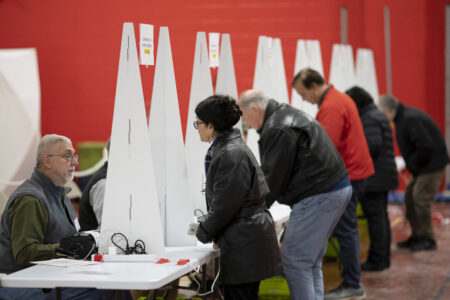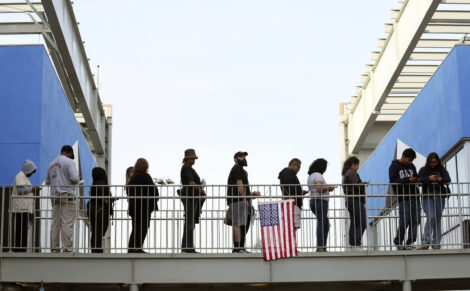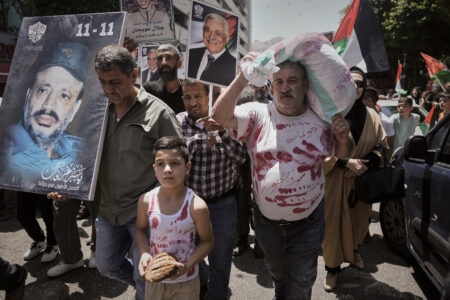On 70th anniversary of tragedy, woman recalls murders of West Virginia family

Photo by Derek Nuzum Bonnie Moore, originally of Pickens, W.Va., survived being shot and the murders of three family members to become a nurse and then a wife, mother and grandmother.
STAUNTON, Va. — On Feb. 11, 1948, a frightened 11-year-old girl lay silently in her bed, bleeding from a gunshot wound, pretending to be dead as a man with a rifle shot and killed three of her family members.
Now, on the eve of the 70th anniversary of that horrific night, Bonnie Moore, now 81, is looking back on that tragedy and speaking about it publicly for the first time.
Although the trauma was indelible, that little girl was determined to live on, and lead a productive life. Today, Bonnie Moore is a grandmother, a wife and the beloved mother of two children, Mark and Margaret, and a stepson, Gary. Trained to become a nurse, she spent several years saving lives at Davis Memorial Hospital in Elkins, the former Kings Daughter Hospital in Staunton and Roanoke Memorial Hospital.
She currently resides in Staunton, Va., with her husband of 57 years, Ernie, and their 18-year-old dog, Missy Sue.
This is what she has made of her life, but it is not her entire story. Until now, she has kept one terrible chapter of her life hidden.
Seventy years have passed since her family was killed in the home where she slept. In the small town of Pickens, W.Va., Lydia Johnson, 55, had taken in her nephew, Denver Johnson, 17, her great-niece Bonnie and her granddaughter Beatrice, 9.
Lydia had gone to a PTA meeting that day in February while Denver watched the girls as he usually did when Lydia was gone.
Bonnie was in bed next to Beatrice when she heard gunshots.
When Lydia returned from the meeting, a man was waiting for her on the porch, Bonnie said. The man shot Lydia in the back several times. Denver was later found in the kitchen with gunshot wounds, too.
Bonnie said the man then made his way to the girls’ room.
“I woke up and saw him standing in the doorway with his rifle, bracing it against the door jam, so that, I guess, he wouldn’t or didn’t want to shake or miss,” she said.
Right before he pulled the trigger, Bonnie woke up and raised her head. She was shot near the mouth.
“And it did not kill me, of course, but it put me out awhile, and I could hear Beatrice crying when he shot her,” she said.
Though Bonnie slipped in and out of consciousness, she remembers the shooter coming closer to the bed, shooting Beatrice four more times, hitting her in the heart with his last shot.
“I would come to enough to where I could realize what was going on and then I’d be out of it again,” she said.
After the shooting stopped, Bonnie lay in bed pretending to be dead, afraid the shooter might come back.
When morning dawned, Bonnie mustered up the energy to get out of bed, still in pain from the gunshot wound to her face.
“I got up and walked into the kitchen, and I tried to get a drink. And I couldn’t get anything in my mouth,” she recalled. “My tongue was so swollen, so all I could do was wet my tongue enough to make it feel like I got a drink. I couldn’t swallow anything ’cause I couldn’t get enough in my mouth.”
After realizing that her family, who had taken her in, were all dead, Bonnie knew she needed to report what happened.
Bonnie left the home, intending to get to where Beatrice’s mother lived. As she walked along the road, three classmates approached her. Seeing she was seriously injured, they ran away from her, frightened by her gurgling sounds and the blood.
“Three big boys — they were teenagers in high school and I was 11,” she recalled. “I remember walking up the road a little ways and I saw a place where I could sit down and get a hold of something and get back up again because I couldn’t propel myself up and down very good, just standing. So I sat down after I found that place … and I laughed because they ran away and left me.
“All I could make was funny noises. I would’ve run too, I guess,” Bonnie said and laughed.
Eventually, she reached the top of the road, where a woman who lived nearby made the boys go back to help her.
“They tried to carry me and that hurt worse than actually getting shot did because they carried me awkwardly, and I couldn’t tell them to put me down and let me walk because all I could make was these funny noises.”
The woman also called a man to drive Bonnie to a nearby hospital, where she was treated.
Bonnie never returned to her Aunt Lydia’s home. Instead, she lived with her grandmother, who kept moving Bonnie around — and for good reason, as it turned out.
When the police visited Bonnie in the hospital they didn’t actually take a statement from her, she said. Because she was unable to speak, police pieced together what happened that night without her eyewitness account.
Investigators assumed Denver had shot his Aunt Lydia and cousin Beatrice with the gun they found on the scene, before turning the weapon on himself.
“Do you think they even thought to give me a pencil and a piece of paper? No, they did not,” Bonnie said about the police. “And they never came back.”
Even after Bonnie’s wound had healed, police never returned for her statement.
“They never came back to question me when I could talk. And there was no one else there that could tell them, so they figured what they could see was all there was,” she said.
However, Bonnie Moore says she saw the actual murderer — and it wasn’t Denver Johnson.
Bonnie speculated another family member did the killings in a dispute over money and land.
The killer “made sure he got rid of the ones who might be in line to inherit anything Aunt Liddy had,” she said.
When police questioned the man about the murders, Bonnie said he had an alibi — he was working at a nearby mine with his father.
“He walked all the way to where we lived at the time and did his dirty work and then he walked back to the mines like he’d never been gone,” Bonnie said.
After the man learned Bonnie was still alive, Bonnie said someone passed on a message that “he would get me yet because he knew I saw him.”
“Someone told me he’d get me yet. But I was always somewhere he couldn’t get to,” she said. “Like I say, most people didn’t have cars back then and he had to walk. So whoever had a car took me home with them, like my uncle took me down to the area where they lived. And I remember being there for a while, but they kept moving me around.”
Bonnie said she was fearful after being released from the hospital.
“I guess maybe for a few weeks afterward any noise I heard or whatever … anytime I felt that something wasn’t right,” she said about the fear that lingered afterward. “I don’t know how to explain it to you.”
After moving several times, Bonnie said the man apparently gave up his hunt for her. She recalls seeing him a few years after the shooting. He acted as though nothing had ever happened. Bonnie said the man died in the 1960s.
As one might expect, Bonnie was deeply affected by this experience, and from time to time still thinks about what happened.
She fondly looks back on her family members — Lydia, who she said was a wonderful aunt who took care of her family; Beatrice, a sweet girl and a friend; and Denver, a cousin who looked after her more like a big brother.
“He would fix our meals and make sure we took our baths and got to bed,” Bonnie said of Denver.
Not only has the memory of the awful incident lingered throughout her life, but because pieces of the bullet are still in her head, Bonnie has experienced painful migraines, which have only lessened in recent years.
“I couldn’t stand any light and I’d pack my head in ice if I could. I’d use ice bags or anything that I could make cold, and I would lay on that so that it would help. It did help some,” she said.
Her husband Ernie said some days when Bonnie would have a bad headache, she’d come home with a patch on one side of her face to ease the pain.
“You couldn’t touch the bed. When she’d get a bad headache, I couldn’t sleep in the bed,” he said.
Though the massacre of her family made national news at the time, Bonnie kept the story to herself over the years. In fact, she didn’t even tell her husband what had happened to her until after they were married.
“I figured they didn’t know anything about it, and it would just be boring,” she said.
Then, while her grandchildren were visiting at Christmas last December, they asked to hear about their grandmother’s life.
“I think that the grandkids also wanted her to tell her story so that people would know that she put herself through college. She’s educated. She was a nurse to help people. And they’re proud of her,” said Suzette Moore, Bonnie’s daughter-in-law. “They’re very proud that she has fought this all her life. And when they finally came to her and said, ‘Share with us your life,’ they were like, ‘This deserves to be told and people need to know that the girl that was shot did a lot with her life.'”
Bonnie said she hopes that by sharing her story she can give peace to other victims of shootings and their families.
“I think that they probably will feel better about knowing exactly what happened,” she said of her own family.






